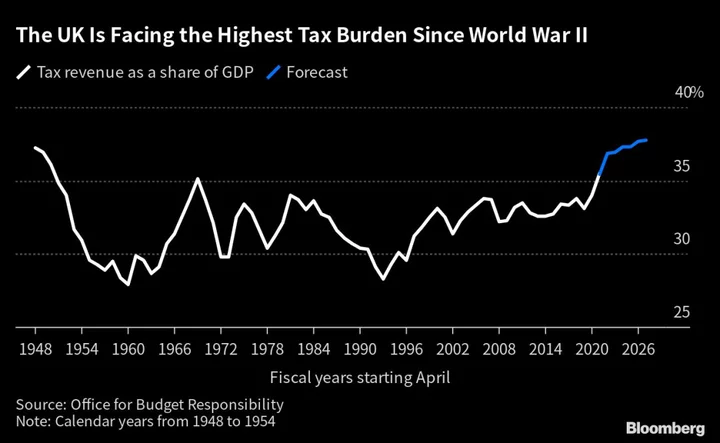Chancellor of the Exchequer Jeremy Hunt said he’ll focus on stimulating growth for Britain’s stagnant economy when he unveils tax and spending plans later this month.
“What you’ll see in the weeks ahead is an autumn statement for growth,” Hunt said on Friday in an interview with Sky News, referring to the fiscal package he’s due to unveil on Nov. 22. “There are many things that we can do to bring back healthy growth to the economy,” he said, citing examples such as unlocking business investment, reforming the welfare system and supporting manufacturing.
Hunt is under growing pressure from inside the governing Conservative Party to use his Nov. 22 statement to announce bold ideas that will help close a polling deficit with the opposition Labour Party that recent surveys have put over 20 points. With a general election expected next year, Prime Minister Rishi Sunak’s government is running out of opportunities to move the needle with the British electorate: the Autumn statement is likely to be the penultimate fiscal event before a vote.
The chancellor spoke after official statistics on Friday showed the UK economy flatlined in the third quarter. The chancellor said that his continuing priority is to curb inflation but that he’ll also announce measures to improve the long-term competitiveness of the UK economy. He’s faced calls from the business community to extend tax breaks — such as making a 100% tax relief on capital spending permanent — and speed up planning decisions.
“We won’t do anything that compromises the battle against inflation,” he said. “We can do a lot to support businesses.”
Read More: UK Industry Urges Hunt to Cut Business Taxes to Spur Growth
The autumn statement has taken on additional significance given the lukewarm reception to Sunak’s King’s Speech laying out the government’s legislative agenda this week, a moment that was meant to act as a reset and give the Tories a boost. Instead it was criticized for lacking detail and ambition, and has since been over-shadowed by controversial comments by Home Secretary Suella Braverman and the row over a pro-Palestine march in London this weekend coinciding with Armistice Day commemorative services.
The other big pressure Hunt faces is to cut taxes, a demand from Conservatives who are angry that the tax burden has risen to its highest since World War II due to pandemic-era spending and rising energy prices caused by Russia’s war in Ukraine. On Friday Hunt said he wouldn’t deliver any tax cuts that would fuel price growth.
“That would be the wrong thing to do when we’re making such good progress against inflation,” he said. “But in the long-run we do want to bring down taxes.”
Sunak has made a pledge to halve inflation this year his centerpiece pledge to the electorate, and Hunt aims to ensure it’s delivered.
Hunt and Sunak have nevertheless been considering potential cuts to stamp duty and inheritance tax, which they deem would be less inflationary than personal tax cuts such as cutting income tax. Hunt will ultimately have to make a political choice about how to use his limited fiscal headroom: the Resolution Foundation think-tank estimates he has a £13 billion buffer against his fiscal rules which he could deploy. While that would be up from £6.5 billion at his budget in March, it’s still low by historic standards.

